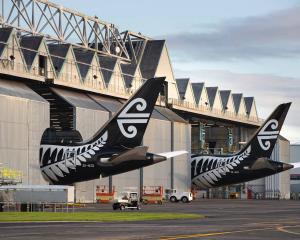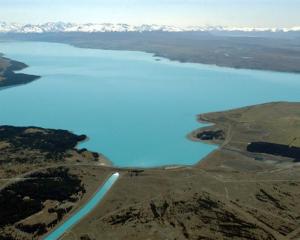Air New Zealand’s annual profit was good news for shareholders and employees but passengers will need to hold their breath for the next few days.
In February, the national airline increased its charges on optional extras less than a week after announcing a near-record profit.
Seat-plus-bag charges rose from $10 to $15 and FlexiTime add-on charges from $30 to $35. FlexiPlus charges increased from $50 to $55. The airline announced its second-highest profit for the June year yesterday, albeit using a mid-table figure in its announcement to the NZX.
The company used earnings before finance costs, associates and taxation to report earnings of $540 million, down from the $545 million reported in the previous corresponding period. Revenue in the year was $5.5 billion, up from $5.1 billon, and the operating earnings, before any adjustments, were $1.29 billion from $1.27 billion.
The final dividend was unchanged at 11c per share, taking the total dividend to 22cps.
Air New Zealand announced staff bonuses of up to $1800 for the 8500 permanent employees who did not participate in a short-term incentive programme.
Chairman Tony Carter praised the strength of the result which, he said, demonstrated the airline’s resiliency.
"This is an impressive financial result, driven by strong revenue growth across the airline’s key markets, as well as continued focus on sustainable cost improvements — despite significantly higher fuel prices."
Chief executive Christopher Luxon acknowledged the impact of external disruptions on the airline’s operational performance and thanked both customers and staff for their loyalty and support.
To deliver greater schedule reliability for customers, Air New Zealand would be leasing three wide-body aircraft — two Boeing 777-200s and one Boeing 777-300 — as well as making adjustments to its schedule as the airline continued to work through the maintenance requirements associated with the global Rolls-Royce Trent 1000 engine issues.
The coming year promised to be exciting for the airline and its customers, he said.
The airline would offer more cheap fares than ever over the next year as domestic jet capacity grew 3% to 5% and regional turbo-prop capacity grew 5% to 7%.
"One of the benefits of a growing Air New Zealand is more opportunities than ever for Kiwis to snap up a bargain. In 2019, we will offer more than 2.9 million seats for travel in New Zealand for under $100."
Forsyth Barr broker Suzanne Kinnaird said strong revenue growth helped to more than offset rising cost pressures, which would continue and intensify in the 2019 financial year.
In particular, fuel costs increased by $165 million in 2018. The rise in passenger revenue of 7% was supported by strong cargo and contract services.
The company had provided first-time profit before tax guidance for 2019 of between $425 million and $525 million, excluding the impact of an estimated $30 million to $40 million from the Rolls-Royce engine issues, she said.
The guidance band was based on an average jet-fuel price of $US85 ($NZ127) a barrel, implying an overall jet-fuel cost increase of about $360 million.
"We expect little shift in market expectations for 2019 earnings in light of the new guidance band."
Air New Zealand yesterday shares closed at $3.265, down 14.5c.
At a glance
• Second-highest profit of $540 million
• Investment of about $150 million expected over the next four years to improve customer experience
• Unchanged final dividend of 11c per share
• Commitment to third short-term leased wide-body aircraft













